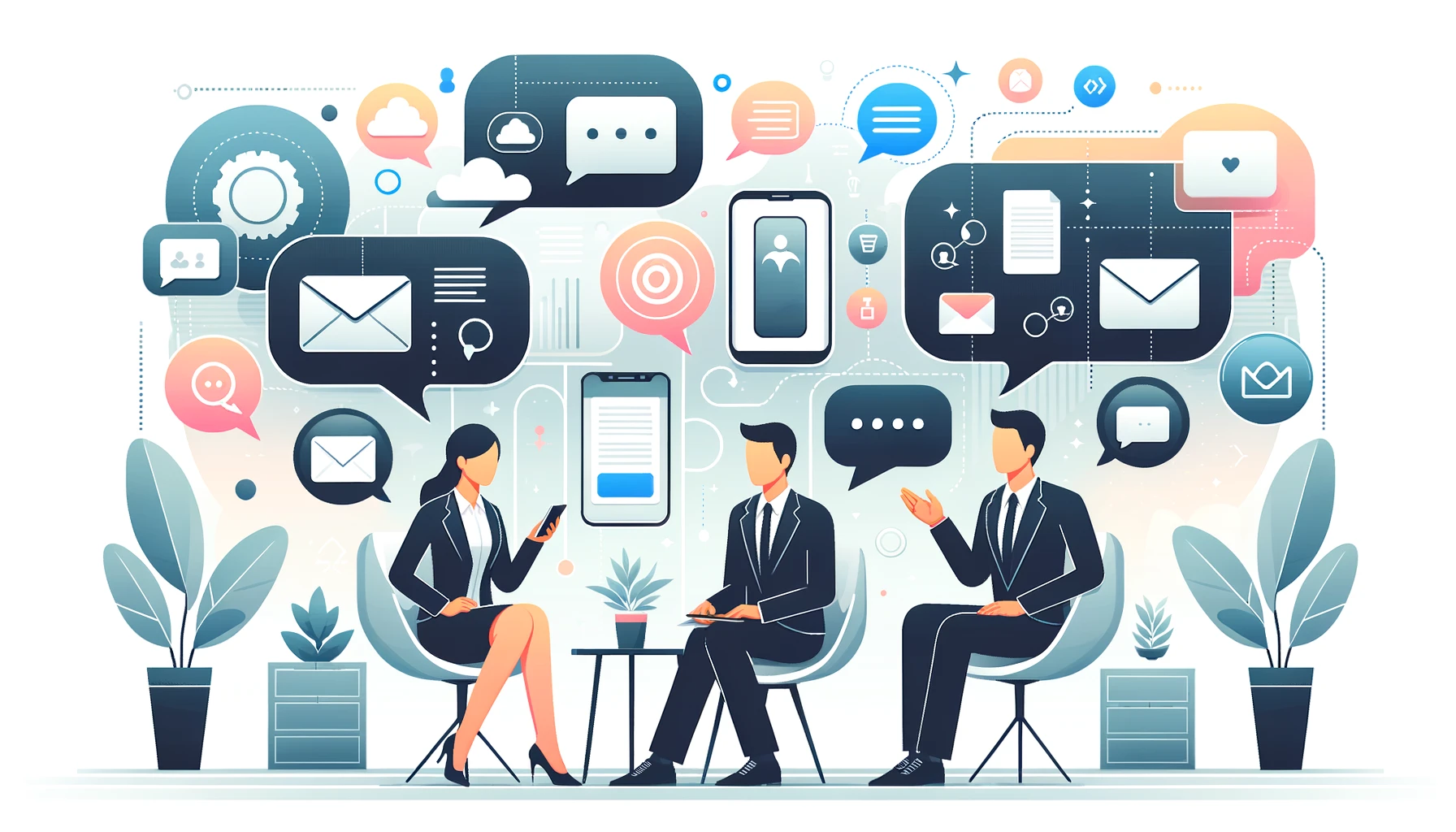
Want to level up your communication skills at work? Becoming a supercommunicator is the key. Ditch the awkward silences and miscommunications for seamless interactions that leave a lasting impact. By mastering the art of effective communication, you can boost productivity, enhance teamwork, and propel your career to new heights. Say goodbye to misunderstandings and hello to clarity and influence in every interaction.
Table of Contents
Defining Supercommunication
Key Habits
Practicing active listening daily is crucial for becoming a supercommunicator. By focusing on the speaker, you show respect and build stronger connections.

Seeking feedback regularly allows you to identify areas for improvement in your communication skills. Embrace constructive criticism as a tool for growth.
Cultivating empathy towards your colleagues enables you to understand their perspectives better. Empathy fosters trust and collaboration in the workplace.
Impact on Life
Becoming a supercommunicator leads to improved relationships at work and home. Clear communication reduces misunderstandings and strengthens bonds.
Enhanced problem-solving skills are a direct result of effective communication. By conveying ideas clearly, you can tackle challenges more efficiently.
Increased overall job satisfaction stems from being a supercommunicator. When your messages are understood, you feel valued and appreciated in your role.
Career Trajectory
Mastering supercommunication opens doors to leadership roles within organizations. Effective communicators are often seen as natural leaders who inspire others.
Your professional reputation receives a significant boost when you excel in communication. Colleagues and supervisors view you as reliable and trustworthy.
Being a supercommunicator increases opportunities for growth and development in your career. Clear communication skills are highly sought after in all industries.
Essential Communication Skills
Active Listening
Active listening is a crucial component of communication skills at work. Maintain eye contact to demonstrate attentiveness and respect during conversations. By doing so, you show the speaker that you are fully engaged in what they are saying. avoid interrupting the speaker as it can disrupt the flow of conversation and make them feel unheard. Instead, wait for appropriate pauses to provide your input or ask questions.
Using verbal cues is another effective way to exhibit active listening. Nodding your head, saying “I see” or “That makes sense,” and summarizing key points back to the speaker can convey that you understand their message. These cues reassure the speaker that their thoughts are being acknowledged and valued.
Deep Questioning
Deep questioning involves asking insightful questions that go beyond surface-level discussions. Ask open-ended questions that prompt detailed responses and encourage meaningful dialogue. These questions typically begin with “why,” “how,” or “what” to delve deeper into a topic and stimulate critical thinking.
When engaging in deep questioning, it’s essential to probe for deeper insights by asking follow-up questions based on the speaker’s responses. This technique helps uncover underlying motivations, concerns, or perspectives that may not have been initially evident. By digging deeper into the conversation, you demonstrate a genuine interest in understanding the other person’s viewpoint.
To enhance communication further, consider challenging assumptions through questioning. By questioning assumptions, you encourage reflection and promote a more thorough exploration of ideas. This approach can lead to innovative solutions, improved decision-making processes, and stronger relationships built on trust and transparency.
Mastering Active Listening
Listening Techniques
To become a supercommunicator at work, individuals must hone their active listening skills. Practice reflective listening by repeating and confirming what the speaker said to demonstrate understanding. Summarize key points after a conversation to ensure clarity and retention of information. Utilize non-verbal cues such as nodding and maintaining eye contact to show engagement without interrupting.
Enhancing Understanding
Clarify information through paraphrasing to confirm comprehension and avoid misinterpretation. Seek different perspectives from colleagues or clients to gain insights and foster empathy in communication. Connect new information to existing knowledge by relating it to past experiences or concepts for better retention and application.
Deep Questioning Techniques
Crafting Questions
Crafting questions is a crucial skill in becoming a supercommunicator at work. Tailor questions to suit the specific audience you are engaging with. By customizing your questions, you can ensure that they resonate and spark interest. When crafting questions, think about the goals of the conversation and what information you aim to gather.

Use questions strategically to guide discussions in a productive direction. By asking open-ended questions, you invite others to share their perspectives and insights. This approach fosters meaningful dialogue and encourages active participation from all team members. Effective questioning can lead to uncovering innovative solutions and driving collaboration within the team.
Encourage critical thinking by posing thought-provoking questions during discussions. These types of questions challenge individuals to think beyond surface-level responses and delve deeper into complex issues. By encouraging critical thinking, you can stimulate intellectual growth within your team and promote a culture of continuous learning.
Encouraging Dialogue
To enhance communication skills, it’s essential to create a safe space for open dialogue at work. Establish an environment where team members feel comfortable expressing their opinions without fear of judgment or reprisal. A safe space fosters trust and openness, paving the way for effective communication.

Foster a culture of respect and inclusivity within your team. Respectful communication involves actively listening to others’ viewpoints, acknowledging their contributions, and valuing diversity of thought. Inclusive communication ensures that every team member feels heard and valued, regardless of their background or perspective.
Encourage team members to share their thoughts and ideas freely during discussions. Emphasize the importance of active participation and create opportunities for everyone to contribute their insights. By fostering an environment where all voices are heard, you can harness the collective wisdom of your team and drive innovation.
Types of Workplace Conversations
Formal Interactions
Formal interactions at work are crucial for effective communication. To excel in these settings, prepare questions beforehand to steer discussions in the right direction. Actively listening during formal meetings helps you grasp key points and respond appropriately. Providing constructive feedback after formal conversations showcases your engagement and commitment.
When engaging in formal meetings, it’s beneficial to have a set of questions ready. This approach demonstrates your preparedness and shows that you value the time spent on discussions. Active listening is essential during presentations to understand complex topics and contribute meaningfully to the conversation. Constructive feedback after formal discussions not only highlights your attentiveness but also fosters a culture of continuous improvement within the team.
Informal Chats
Informal chats are equally important in fostering relationships at work. Engaging in casual conversations with colleagues helps build rapport and create a comfortable working environment. Even during informal settings, it’s essential to listen attentively to show respect and interest in your colleagues’ thoughts and opinions. Utilize informal chats as opportunities to strengthen relationships with coworkers, leading to better collaboration and teamwork.
In informal settings, casual conversations play a significant role in creating a positive work atmosphere. Building rapport through informal chats can lead to stronger connections with colleagues, enhancing teamwork and overall productivity. Active listening during these informal interactions shows your genuine interest in others’ perspectives and fosters open communication within the team.
Clear Workplace Communication
Conveying Messages
To excel in great communication, ensure messages are clear and concise, avoiding ambiguity or confusion. Tailor your communication style based on the recipient’s preferences and understanding level. Utilize visual aids like charts or graphs to further enhance message clarity.
When conveying messages, focus on being direct and to the point, ensuring that information is easily understood by all parties involved. Adapt your tone and language to suit the audience, whether it’s a formal email or an informal chat with colleagues. Visual aids can be powerful tools in reinforcing key points and making complex information more digestible.
Receiving Feedback
Accept feedback openly and without defensiveness, viewing it as an opportunity for growth and improvement. Reflect on the feedback received to pinpoint specific areas where adjustments can be made. Express gratitude towards those providing feedback, acknowledging their insights and willingness to help you develop professionally.
Feedback is a valuable tool for self-improvement, offering perspectives that may not have been apparent initially. By accepting feedback graciously, you demonstrate humility and a commitment to personal development. Remember, constructive criticism is meant to guide you towards becoming a more effective communicator at work.
Practical Communication Tips
Daily Practices
To become a supercommunicator at work, individuals should set aside time for reflection and self-assessment. This practice allows them to evaluate their communication style regularly.
Engaging in active listening during all interactions is crucial. By giving full attention to the speaker and showing genuine interest, one can enhance understanding.
Continuous learning plays a vital role in enhancing communication skills. By seeking out new knowledge and practicing new techniques, individuals can stay ahead in the workplace.
Overcoming Barriers
Identifying and addressing communication barriers proactively is essential. By recognizing common obstacles such as misunderstandings or cultural differences, individuals can find effective solutions.
Seeking training or coaching to overcome specific challenges is beneficial. Professional guidance can help individuals develop strategies to navigate complex communication situations.

Collaborating with colleagues to find solutions to communication obstacles fosters teamwork. By sharing experiences and brainstorming together, teams can create a supportive environment for effective communication.
Benefits of Supercommunication
Career Advancement
Supercommunication offers numerous benefits for career growth. Showcase your exceptional communication skills in job applications to stand out from other candidates. Highlight how you effectively convey ideas, listen actively, and collaborate seamlessly.
Moreover, demonstrate your leadership potential through clear and concise communication. Leaders who excel in communication inspire trust, motivate teams, and drive success. By mastering supercommunication, you can position yourself as a strong leader within your organization.
Leverage your enhanced communication skills to advance in your career. Articulate your thoughts persuasively during meetings, presentations, and negotiations. Effective communicators often have more opportunities for promotions and are entrusted with critical projects.
Quality of Life
Becoming a supercommunicator not only benefits your career but also enhances your personal life. Improve personal relationships by fostering open and honest communication. Expressing thoughts and feelings clearly can strengthen bonds with family, friends, and colleagues.
Reduce misunderstandings and conflicts in daily interactions by honing your communication skills. Listen actively, seek clarification when needed, and express yourself assertively yet respectfully. Clear communication minimizes confusion and promotes harmony in all aspects of life.
Enhance your overall well-being by becoming a supercommunicator. Effective communication leads to better collaboration, reduced stress levels, and improved mental health. By mastering the art of supercommunication, you can create a positive impact on both your professional and personal life.
Implementing Supercommunication Strategies
Setting Goals
To become a supercommunicator, individuals should establish SMART goals for self-improvement. These goals should be Specific, Measurable, Achievable, Relevant, and Time-bound. By setting clear objectives, one can focus on improving specific aspects of communication effectively.
Breaking down long-term communication goals into manageable steps is crucial. This approach helps in avoiding overwhelm and allows for steady progress towards achieving the ultimate goal of becoming an exceptional communicator. Each small step taken contributes to significant improvements over time.
Regularly monitoring progress towards communication goals is essential for growth. By tracking achievements and identifying areas that need improvement, individuals can adjust their strategies accordingly. This active involvement in self-assessment promotes continuous learning and development.
Tracking Progress
Keeping a communication journal is a powerful tool for tracking improvements. Documenting daily interactions, challenges faced, and successful communication strategies provides valuable insights into personal progress. Reflecting on these entries helps in recognizing patterns and areas needing more attention.
Seeking feedback from peers is another effective way to track communication progress. Colleagues can offer valuable perspectives on strengths and areas for improvement. Constructive feedback enables individuals to gain new insights and tailor their communication style to better connect with others.
Celebrating milestones achieved in enhancing communication skills is crucial for motivation. Recognizing even small victories along the way boosts confidence and reinforces positive behavior changes. Whether it’s successfully leading a meeting or handling a challenging conversation with finesse, acknowledging achievements fuels further growth.
Closing Thoughts
You now have a solid understanding of what it takes to become a supercommunicator at work. By honing your essential communication skills, mastering active listening, and utilizing deep questioning techniques, you are well on your way to transforming your workplace interactions. Remember the different types of workplace conversations and the importance of clear communication in all your exchanges. Implement the practical tips provided and reap the benefits of supercommunication in your professional life.
Take charge of your communication skills today. Start implementing these strategies, and watch how your interactions at work improve drastically. Supercommunication is within your reach—embrace it and elevate your success in the workplace!
Related News:
Featured Image courtesy of DALL-E by ChatGPT
